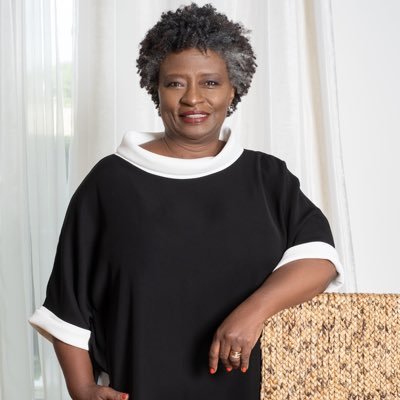The President and Co-founder of Institute for Global Health and Development (IGHD), Guinea-Bissau, who also leads CPHIA 2023 track on For Women by Women, Dr. Magda Robalo, has called for all inclusiveness in the Africa Centre for Disease Control’s annual International Conference on Public Health in Africa (CPHIA) this year.
According to her, there is the need for all and sundry to participate in this year’s conference to deliberate more on Women in Health; from Recipients to Providers to Leaders.
Also, specifically on unique barriers that hinder women’s access to essential healthcare services, including reproductive health, maternal care, sexual health, and mental well-being and the need for gender-responsive and women-centered solutions to address the disparities and work towards achieving equitable healthcare for all and other relatively important themes.
The annual Conference is being hosted by the Africa Center for Disease Control and Prevention (CDC) and the African Union in partnership with Zambia Ministry of Health.
This year’s conference is scheduled for 27-30 November 2023 in Lusaka, Zambia, and it will take a more forward-looking approach, highlighting how stakeholders across the continent are breaking barriers and disrupting the status quo through cutting-edge science and programming under the theme “Breaking Barriers: Repositioning Africa in the global health architecture.”
The conference will focus on 9 tracks that will be discussed such as;
Epidemiology, Diagnostics and Clinical Management of Emerging and Re-emerging High Consequence Infectious Diseases (HCID) in Africa
- Increasing Local Production in Africa: Advocacy, Research and Development Capacity in Diagnostics, Therapeutics and Vaccine Manufacturing
- Strengthening Health Systems for Equitable and Universal Health Coverage in Africa
- Women in Health – from Recipients to Providers to Leaders
- Safeguarding Africa’s Health Security: health emergencies, biosecurity, climate change, and multi-sectoral response mechanisms
- Digital Innovations in Health – Delivering Universal, Affordable, Connected and Resilient Health Systems
- Whole-of-society – the Power of Engaging Civil Society, Philanthropy, Community Actors, and the Private Sector
- A Renewed focus on Africa’s Major Infectious Diseases: HIV, TB and Malaria and NTDs
- Non-Communicable Diseases – a Growing Public Health Threat in Africa
Sharing her view on the on unique barriers that hinder women’s access to essential healthcare services, including reproductive health, maternal care, sexual health, and mental well-being the need for gender-responsive and women-centered solutions to address the disparities and work towards achieving equitable healthcare for all and other relatively important themes, Dr. Magda Robalo, said most health facilities lack the confidentiality that is required for offering testing services to the people.
Citing an example, she said this is because “when you see a global health in most countries, we focus on reproductive health for women. We forget that before becoming women of reproductive age, when you can child bear, you have other health needs. You have had health problems that require attention.
Even when you have, after your child very age, you also still have health needs which are not taken into consideration”.
Furthermore, Dr. Magda said the health care system, focus particularly during the productive health age and the productive health needs, family planning, maternal health, forgetting that women also have cancer, women have cardiovascular diseases, and women have mental health problems.
This, she said there is the need for a holistic approach to the health of women within the health system so that women can access the services they need, and they can be looked at by a nurse, by a doctor, as a woman, a human being that has other health challenges, not necessarily only for the reproductive health overall.
Also, she disclosed that the challenges with women’s health is not just a problem in Africa but across the world, “this is a problem that the lack of domestic perspective in when it comes to women’s health is not particular to Africa.
We see that’s across the world cause, in Africa is worse than other parts of the world. But across the world, we see that women are consistently diagnosed later of disease or misdiagnosed than men”.
“We see that clinical trials of reproductive health diseases are more often conducted on male patients or male candidates. And the diseases are better known and diagnosed in men than in women.
And when it comes also about trying testing medicine to treat particular diseases, you’ll see that the scientific knowledge is more abundant on how those medicines acts in male bodies than in female bodies, because the tests of the clinical trials are done mostly in men”. Dr. Magda added.
She also emphasized on social and cultural traditions, and beliefs that our societies have, over the centuries established as norms that make women the weaker member of the family.
Another factor on barriers that hinder women’s access to essential healthcare services, Dr. Magda said is also stigma in the health facilities about young girls who, who are too young to be considered a woman and too old to be considered a child and they don’t find the right space in health facilities for adolescents to ask questions that comes in the transformations their body go through.
On ways that health services should address challenges that come with women’s access to essential healthcare she said it is important to recognize women’s health in a ballistic passion, thus to see women beyond reproductive health and violence.
“More so, a holistic approach to women’s health from birth to death is critical for our health systems. If we don’t reform our systems to provide services that will take care of women from day to day, different types of services, which will care for particularly needs of women’s help”, Dr. Magda mentioned.
She urged health services providers to invest more in research about women’s health so that they have a better understanding of what happens to the women’s body from birth to death by coming up with preventive tools and diagnostic tools that are specific to the health needs of women.
She concluded by urging the need to also address is the all issue of gender inequality, saying, “As long as women continue to be trapped into the social and cultural norms that put them at the low level, in our societies it will be difficult for women to try and access health care as and when they need it. So we need to check gender inequality if women are to be given the health care they need at every stage of their lives”
Background
The annual International Conference on Public Health in Africa (CPHIA) provides a unique African-led platform for leaders across the continent to reflect on lessons learned in health and science, and align on a way forward for creating more resilient health systems.
Expanding the horizons of the conference once again, CPHIA 2023 will showcase how the continent is breaking down barriers, reaffirming Africa as a powerhouse in science and innovation, generator of new knowledge and health products, and exemplar of progress.
As African countries accelerate the realisation of a New Public Health Order, this year’s conference will help to build a healthier, more prosperous Africa – for the continent, and the world.









